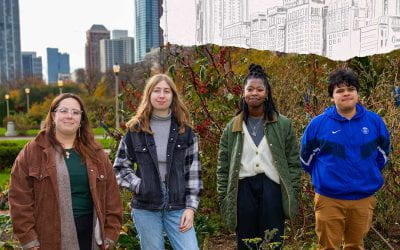Change Agents
5 Alumni Transforming Their Communitiesby Katy Cesarotti

Mary Ann Mahon-Huels with members of the Union League Boys and Girls Clubs
Since the first students registered for classes in 1945, Roosevelt University has remained committed to keeping classes small and connections personal. But our impact goes far beyond our two city blocks downtown. Roosevelt alumni have built networks that touch the lives of tens of thousands, in Chicago and across the nation.
These Roosevelt graduates have dedicated their careers — in the classroom, on the basketball court, and at the concert hall — to serving others. Meet five alumni who carry the torch of Roosevelt’s social justice mission.

MARY ANN MAHON-HUELS
MPA ’90
CEO, Union League Boys & Girls Clubs
For the last two decades, Mary Ann Mahon-Huels has helped define the success of the Union League Boys & Girls Clubs. As CEO and president, she works with a “world-class” board of trustees and directors to support Chicago’s underserved youth.
Today the clubs serve over 15,000 young people across the city. In Humboldt Park, members compete in underwater robotics and at science fairs. In Pilsen, youth make blankets for people experiencing homelessness and serve Thanksgiving dinner to seniors through the Keystone program. Over a thousand young people learn over the summer at a resident camp in Salem, Wisconsin.
“Our youth are becoming outstanding citizens in their communities,” said Mahon-Huels. “Together, we are changing lives.”

Mary Ann Mahon-Huels with members of the Union League Boys and Girls Clubs.
A Foundation for Leadership
As a young professional, newly appointed as the club director of the Bridgeport Boys & Girls Club, Mahon-Huels knew she needed to continue her education to grow in her career. At Roosevelt, she could take classes part-time toward her MPA degree while keeping her full-time job.
“The school was convenient, affordable and a place where I felt welcomed,” she said. “Roosevelt gave me the groundwork that enabled me to become the leader I am today.”
“The school was convenient, affordable and a place where I felt welcomed. Roosevelt gave me the groundwork that enabled me to become the leader I am today.”
— Mary Ann Mahon-Huels
Roosevelt’s social-justice mission, she says, has influenced all her work since. “Whether it was seeing faculty organizing and speaking on issues facing not only Chicago, but the world, or joining in on events organized by students to help people who needed us in our communities, I was always inspired to do more while there,” the alumna said.
Building Great Futures
The Union League Boys & Girls Clubs provide cutting-edge programs in three core areas: academic success, healthy lifestyles, and good character and leadership. Students without access to technology can do homework at a dedicated computer lab. Staff members help youth explore career interests and work towards their goals. Mahon-Huels says that for children who already face many challenges, the clubs are a home away from home.
The alumna remembers chatting with a 12-year-old award winner at a recent Youth of the Year dinner. The boy had been adopted earlier that day and was thrilled that his new parents were meeting his Boys & Girls Club family.
“I will never forget the smile on his face when he told me that this was the best day of his life,” she said. “He was so grateful to his Boys & Girls Club family because not only did they provide quality programs for him, but they gave him the skills he needed to be the leader he is today.”
Advice for Prospective Students
To those considering a Roosevelt degree, Mahon-Huels says, “Take the challenge! Invest in your future and stay the course, because your dreams can become reality at Roosevelt.”
•1988: appointed club director in Bridgeport.
•1994: promoted to VP of operations at the Boys and Girls Clubs of Chicago.
•1999: becomes CEO and president, overseeing 4 locations that serve 3,000 youth.
•2020: the organization grows to serve 15,000 youth at 12 locations.
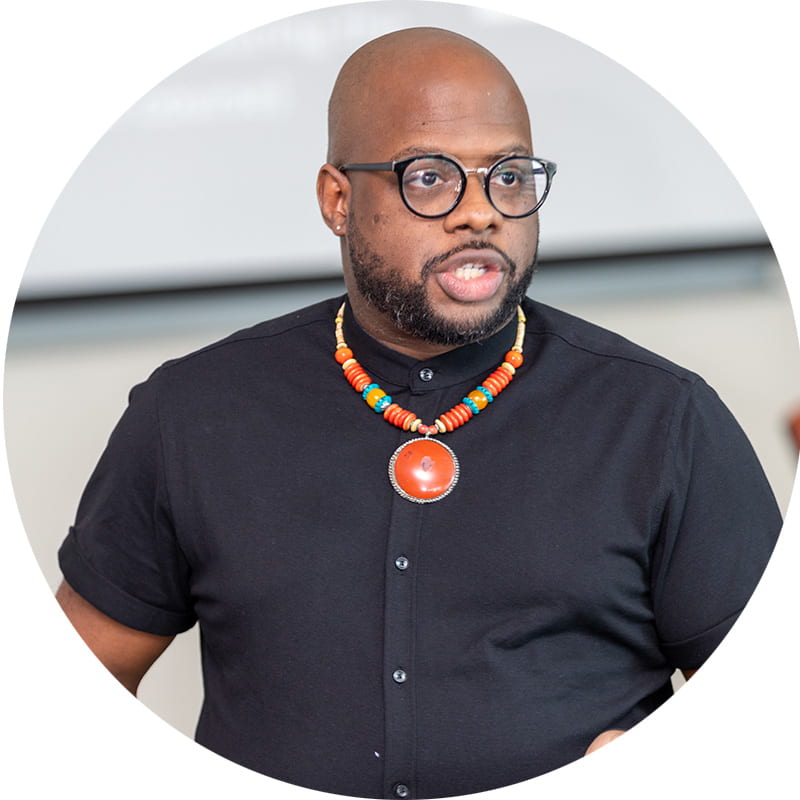
ADRIAN DUNN
BM Voice ’07, MM Voice ’11
Singer, Songwriter and Producer
“Bells,” one of the tracks on The Adrian Dunn Singers’ Redemption, is dedicated to police-violence victim Tamir Rice. As the song unfolds, stark soprano voices ring out like gunshots. Female singers call and respond like pleading mothers. Even the silences are deafening. The album was recorded live in Chicago, and listeners can hear the audience’s response layered with the ensemble and the Rise Orchestra.
Like “Bells,” each song on Redemption honors a young Black victim of police violence, except for one in honor of the Exonerated Five. Arranged by Adrian Dunn, the album reimagines spirituals and gospel songs in a modern context.
“Black folks are the authors and creators of American music,” Dunn said. “This work is multilayered, but all of it is valuable and needs to be said, and there’s not a better time than now to say it.”
Legacy and Black Music
As a Roosevelt student, Adrian founded the Legacy Black Music Project, a faculty and student collaboration that culminated in a choral performance during Black History Month. The project exposed Black classical composers left out of the canon — and often the classroom.
Dunn handled the artistic direction and worked with the Center for Black Music Research at Columbia College to find historical scores. Working with the University’s advancement team, he researched the accomplished black performers who, like him, had studied at the Chicago College of Performing Arts, and reached out to alums to help fund the project.
The project became an incubator for ideas that evolved into Hopera, an award-winning hip-hop opera that allowed Dunn to reimagine his story as a young Black man. Dunn served as principal conductor, composer and executive producer.
“I wanted to tell my story on my terms,” he said. “My work at Roosevelt gave me all of the tools I needed to fundraise, write grants and figure all of that out.”
“I wanted to tell my story on my terms. My work at Roosevelt gave me all of the tools I needed.”
— Adrian Dunn
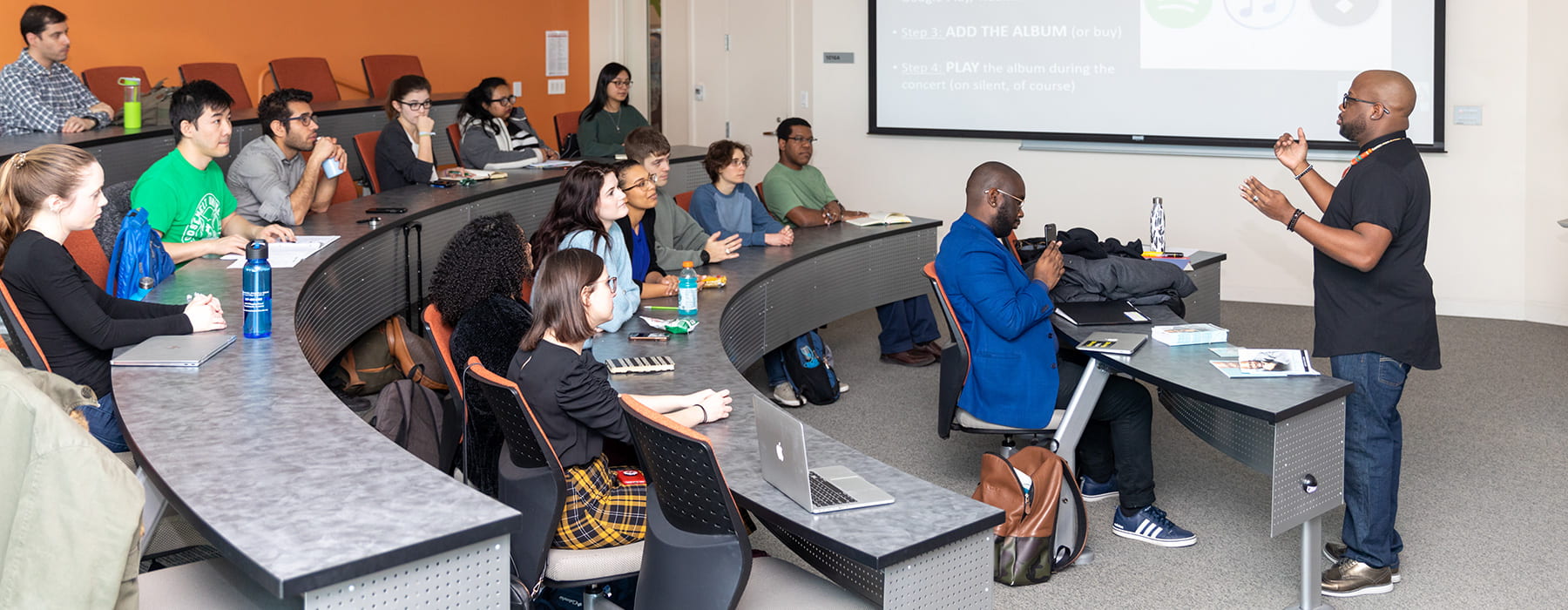
As an alumnus-in-residence, Adrian Dunn hosts a session with Roosevelt's Center for Arts Leadership during Black History Month.
Revelations and Redemption
With The Adrian Dunn Singers, the Roosevelt alum realized his long-held dream of an all-Black professional vocal ensemble. “The group can embody my ideas and bring them to life in a way that most groups can’t,” he said. “When people understand your experience, certain things just make sense and flow.”
In Redemption, Dunn takes spirituals out of the traditional slave narrative and places them in a contemporary context. The album draws a through line between victims of police violence, Emmett Till and, even further back, the era of slavery when these songs were written.
“This is a fight that is still happening,” Dunn said. “We sometimes think of art as this thing that makes us feel good. We don’t really want to be accountable for our collective history.”
In 2020, The Adrian Dunn Singers toured the nation with performances in Los Angeles, Orlando, Cleveland and Chicago. Dunn named it the Black Music Matters tour to draw attention to Black musicians and their ongoing struggle for recognition. In February, the ensemble returned to Roosevelt to perform Redemption with the student orchestra.
“It’s very rewarding to come back to Roosevelt 15 years later with a justice project, building on that work that I was doing as an 18-year-old kid,” he said.
Dunn dedicated the performance to Bonnie Wedington, a former Chicago College of Performing Arts executive secretary who passed away in 2019. When Dunn came out, his parents cut off communication and tuition payments. Wedington’s support helped him through. “She was like my mother when I was here,” Dunn said. “Bonnie taught me how to navigate an institution, how to be a black 18-year old and survive.”
In January, Dunn returned to Roosevelt on the other side of the classroom, as an artist faculty member in the Theatre Conservatory. As a voice instructor, he hopes to create a space where students and musicians can see a person of color who represents their experience.
“It’s significant for students to see a Black man in a space often dominated by white folks, because this is a training ground for the next generation of artists and world-changers,” he said. “I’m excited to play a little piece in the narrative here.”
•2009: wins a MacArthur grant for Hopera.
•2019: conducts The Adrian Dunn Singers debut at the National Cathedral.
•2019: hosts RISE: Black Millennial Music & Justice Symposium.
•2020: debuts with The Adrian Dunn Singers at the Symphony Center and Wentz Hall.
•2020: serves as chorus master for the Chicago Opera Theater’s Freedom Ride.
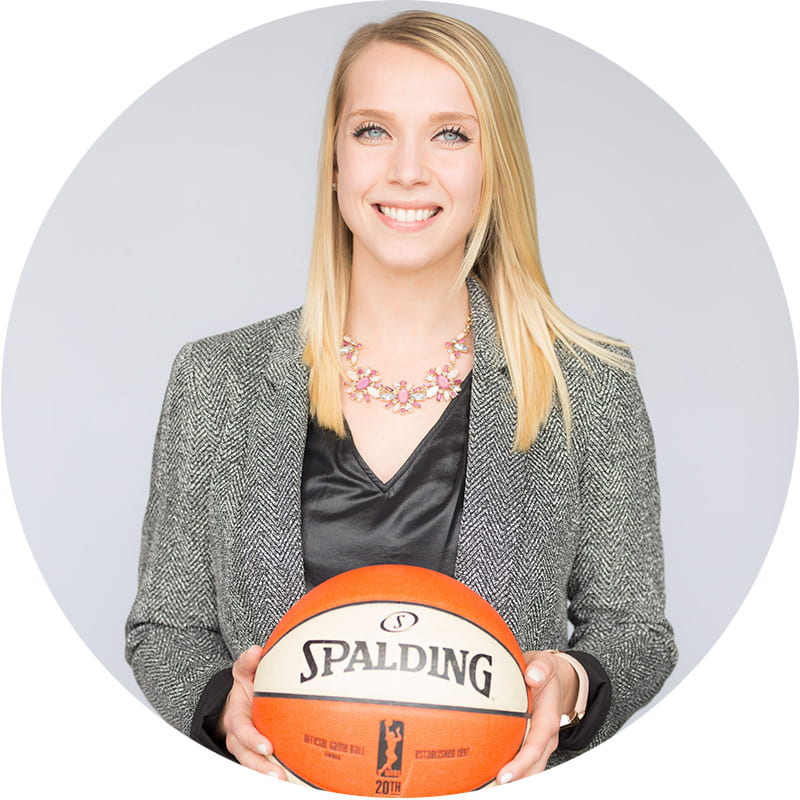
ERIN McCASLIN
BS Marketing, ’14
Manager of Social Responsibility, Seattle Storm
On National Girls and Women in Sports Day, 50 students spent the afternoon with a professional basketball player and staff from the Seattle Storm. At an underserved school in Seattle, the WNBA player joined in drills and shared an important message about what it means to be respectful, how to encourage your teammates, and how girls can do everything that boys can.
The event, organized and executed by alumna Erin McCaslin, demonstrated that basketball is more than just a pastime: It’s a vehicle for life lessons, on and off the court.
Leadership and Basketball
McCaslin came to Roosevelt from Maple Valley, Washington at a pivotal time for the University. She was one of the Lakers’ first women’s basketball recruits in 2010, and both the new Wabash Building and the Goodman Center opened while she was a student.
“I was very shy in high school, and coming to Roosevelt gave me the opportunity to put myself out there,” she said. “Leadership is one of the most valuable skills that I learned from sports: how I can lift my teammates up or help with constructive feedback and guide everyone toward one common goal.”
McCaslin remembers running the mile down the lakeshore, walking in the cold to six a.m. workouts, leading mini-basketball clinics at Chicago schools. The team’s first practice in the new Goodman Center was the culmination of all of their hard work. “Some of my best friends are girls on that team,” she said. “To keep in touch with them today and see all the great work that they’re doing just shows what a strong team we were.”
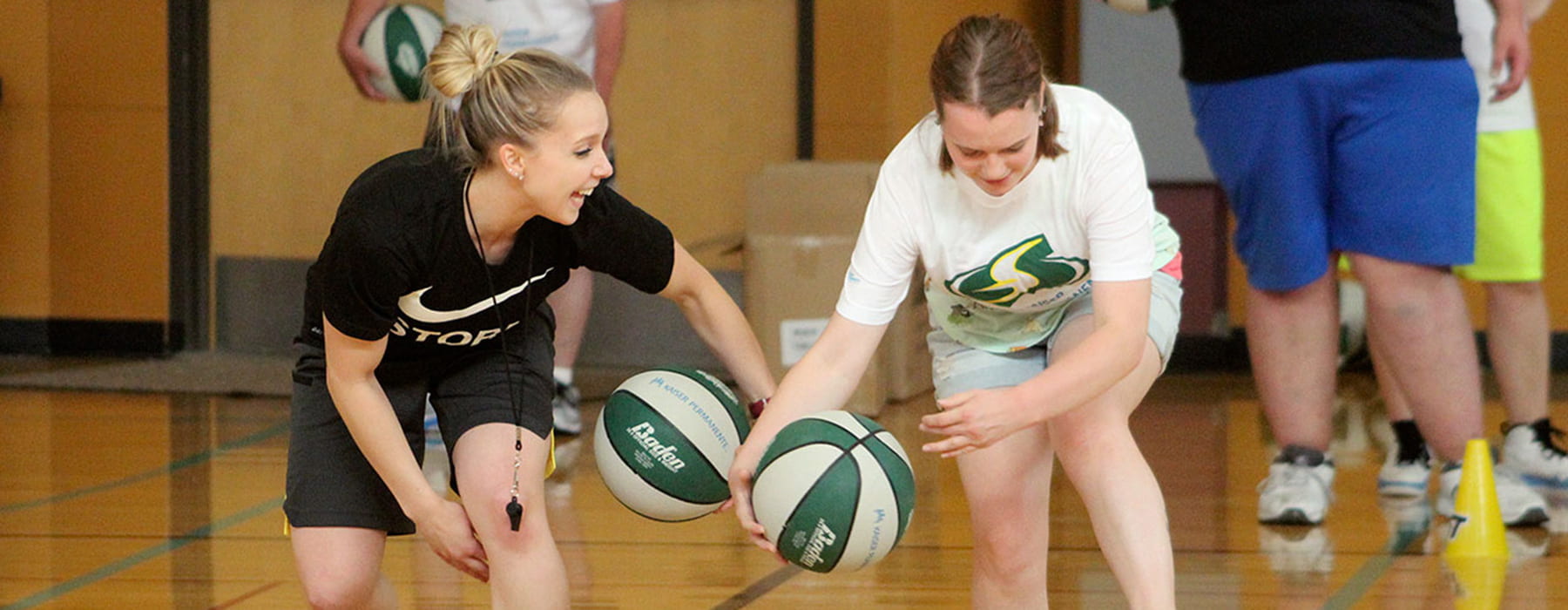
Erin McCaslin, left, runs through practice drills at an event with Federal Way’s Special Olympics basketball team.
Social Responsibility
At the Storm, McCaslin builds relationships with corporate and community partners, creating three-way projects that combine their strengths. Through community relations programs, the Storm incentivizes students in the classroom with complimentary tickets and provides basketball clinics for youth without access to the sport they love. In StormAcademy sessions, 50 girls visit one of the Storm’s corporate partners to learn about STEM topics, incorporating leadership, teamwork and perseverance — all skills required for great basketball.
McCaslin especially loves her work supporting children with cancer, finding ways to make them feel like champions. On February 5, the Storm signed 16-year-old Sam Dorey to an honorary contract after her leukemia had gone into remission. A year before, doctors had told Sam she would never be able to play sports again. The girl was able to meet her idol Jordin Canada, showcase her love for basketball, and recover a dream she had given up on.
“That community support from the Storm really lifted her,” McCaslin said. “Now she’s just ecstatic to be able to join her team and play again.”
Role Models
Recently, McCaslin and the Storm partnered with Nike to inspire young athletes — according to research, girls are twice as likely as boys to drop out of sports by age 14. McCaslin supported the work of two eighth-graders who had a dream of inspiring 50 girls to participate in a free basketball session. Of the 53 that attended, 24 were trying out basketball for the first time.
Outside of work, McCaslin also coaches a seventh-grade girls’ basketball team. As a role model who has been in their shoes, she enjoys helping them overcome adversity and celebrating their accomplishments.
“Part of my work is showing girls that they are enough,” McCaslin said. “That they can get to the next level, but they have to be committed and driven. It doesn’t happen overnight.”
•2012: beats Trinity Christian 90-62 in the first home game in the Goodman Center.
•2013: wins CCAC regular season and tournament championships.
•2013: interns with the Roosevelt University Athletic Department.
•2014: interns at the Seattle Storm after graduation.
•2017: becomes manager of social responsibility at the Seattle Storm.
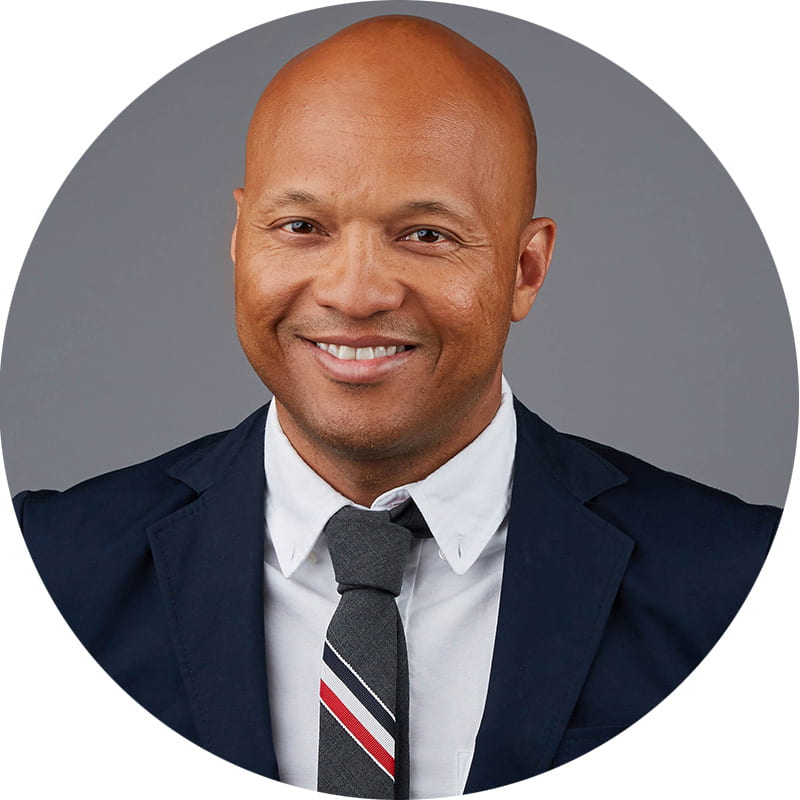
GREGORY JONES
MA Secondary Education ’98, EdD ’05
Executive Director, The Academy Chicago
In April 2018, Kenwood Academy principal Gregory Jones opened the gymnasium door to find hundreds of children and teachers cheering for him. Golden Apple had surprised him with the prestigious Stanley C. Golder Award, a well-deserved recognition for the incredible strides made at Kenwood in the past six years. “My time there was one of the best experiences I’ve had as a human being and an educator,” Jones said.
Now, as the executive director of The Academy Chicago, Jones has the chance to impact the lives of students across the city.
The first organization of its kind, The Academy Chicago provides academic support, mentoring and work experience to young people over a 14-year period, fourth grade through college. The social-impact startup hopes to scale its revolutionary model across the country.
Merging Business with Education
Jones applied to Roosevelt because the master’s program united his interest in teaching social studies and his undergraduate background in business. “I was excited the type of instruction that the professors provided, which was very progressive and ahead of its competitors,” he said.
After graduation, Jones quickly found a full-time position, and didn’t experience the first-year struggles that new teachers often face. Roosevelt, he said, prepared him to focus on the big challenges: building a family, bettering his craft.
In the early 2000s, Jones returned for his doctorate in educational leadership and organizational change. Roosevelt’s program, he said, “provided both the theoretical framework and the tactical training that allowed me to mold into a true leadership role.” His dissertation helped him become a stronger writer and a stronger thinker about critical issues in higher education.
“Particularly for young people who aren’t interested in leaving the city or going to a larger public institution, I always felt like Roosevelt was a great place to get a quality education,” said Jones.
A Learning Community
In 2012, Jones became principal of Kenwood Academy, a Hyde Park high school where nearly 60% of students are at the poverty level. “Oftentimes, you find folks going into a startup by trying to figure out what’s wrong,” Jones said. “I approach the work by leveraging the talent, the good work, and the historical knowledge in schools, while identifying gaps for improvement.”
The Roosevelt alum knew he wasn’t going at it alone. By engaging teachers, parents and students, and listening to their feedback, he found new ways for the community to collaborate.
As principal, Jones didn’t just boost the four-year graduation rate (which rose 35%) or the freshman on-track rate (which rose 37%). He supported the expansion of the jazz band, a new sculpture program, competitive athletics for both boys and girls, and launched the only orchestra on the South Side.
“In urban schools, we have such a laser focus on standardized testing and achievement metrics that we don’t talk about comprehensive equity,” said Jones.
New Horizons
In 2018, Jones was offered a new role that, he said, “was the kind of opportunity I couldn’t pass up.”
At The Academy Chicago, Jones oversees programs that serve 379 students, 95% of whom are black or Latinx. At scale, The Academy Chicago will serve 1,000 students. Working with public schools, the Academy helps students acquire skills that create wealth for their communities. When kids are excited about entrepreneurship, leadership and financial literacy, the lessons feel real.
During the year, students have access to individual tutoring, leadership development and field trips throughout Chicago. In the four-week summer intensive, fourth-graders might brainstorm companies for a Shark Tank–like pitch. Middle schoolers experiment with design, technology and social justice. And in high school, students work with executive mentors and take challenging business seminars. “It’s exciting to see kids engage in these experiences at a level where they can really understand the principles,” Jones said.
The Academy is funded by private investments and the returns on its diverse portfolio of for-profit companies. In turn, its partners offer paid internships and guaranteed job placement for students who complete the program. As students, participants can earn about $2,000 a year — $20,000 in total — toward a personal college fund.
For Jones, the role brings everything full circle. With a new model, he’s doing the work he’s always done: serving young people without access to quality opportunities beyond their public schools, and creating the programs they deserve.
•2008: co-founds Westinghouse College Prep as assistant principal.
•2015: co-founds floChicago, a leadership program for high school students.
•2017: featured in the New York Times op-ed “Want to Fix Schools? Go to the Principal’s Office.”
•2018: joins The Academy Chicago.

RIMPLE PATEL
PharmD ’18
Post-Graduate Year Two Resident, Sinai Health Systems
At a regional pharmacy conference, Rimple Patel was in the audience as a patient relived her struggle to get cancer treatment. When the patient was first diagnosed, she was uninsured and couldn’t afford her medication. When someone connected her with Mount Sinai hospital, the woman received treatment at no cost through the 340B drug pricing program. It saved her life.
Patel was moved. As a pharmacy resident at Sinai Health Systems, the Roosevelt alumna is deeply involved in the 340B program. “What I enjoy most about this residency is working at a safety-net hospital,” she said. “Sinai Health System provides care to all patients, regardless of their ability to pay.”
A Family Affair
For Patel, pharmacy runs in the family. Both of her siblings are pharmacists, and her brother, Chirag, also graduated from the Roosevelt PharmD program.
As an undergraduate, Patel gained experience in the field as a pharmacy technician at Walgreens and a volunteer at the Carle Foundation Hospital. “What really inspired me to choose this career path was witnessing the positive impact that pharmacists have on patients,” she said.
The Three Cs of Pharmacy
At the time, the College of Pharmacy was the only three-year PharmD program in the Midwest. “I was drawn to the small class size, the diverse student body and high job placement rate,” Patel said. The accelerated curriculum built the three Cs — competence, compassion and commitment — that have helped her succeed.
Roosevelt also opened doors to internships with top-ranked hospitals. During her first year, Patel landed a job at Northwestern Memorial Hospital. In 2017, during her rotation at Mount Sinai, she worked closely with the progressive management team.
Professors Jason Alegro and Kelli Covington continue to serve as Patel’s mentors. At Roosevelt, they encouraged her to get involved in extracurriculars; after graduation, they inspired and supported her through her residency. “With the constructive feedback they provided, I was able to develop into a young pharmacy leader,” said Patel.
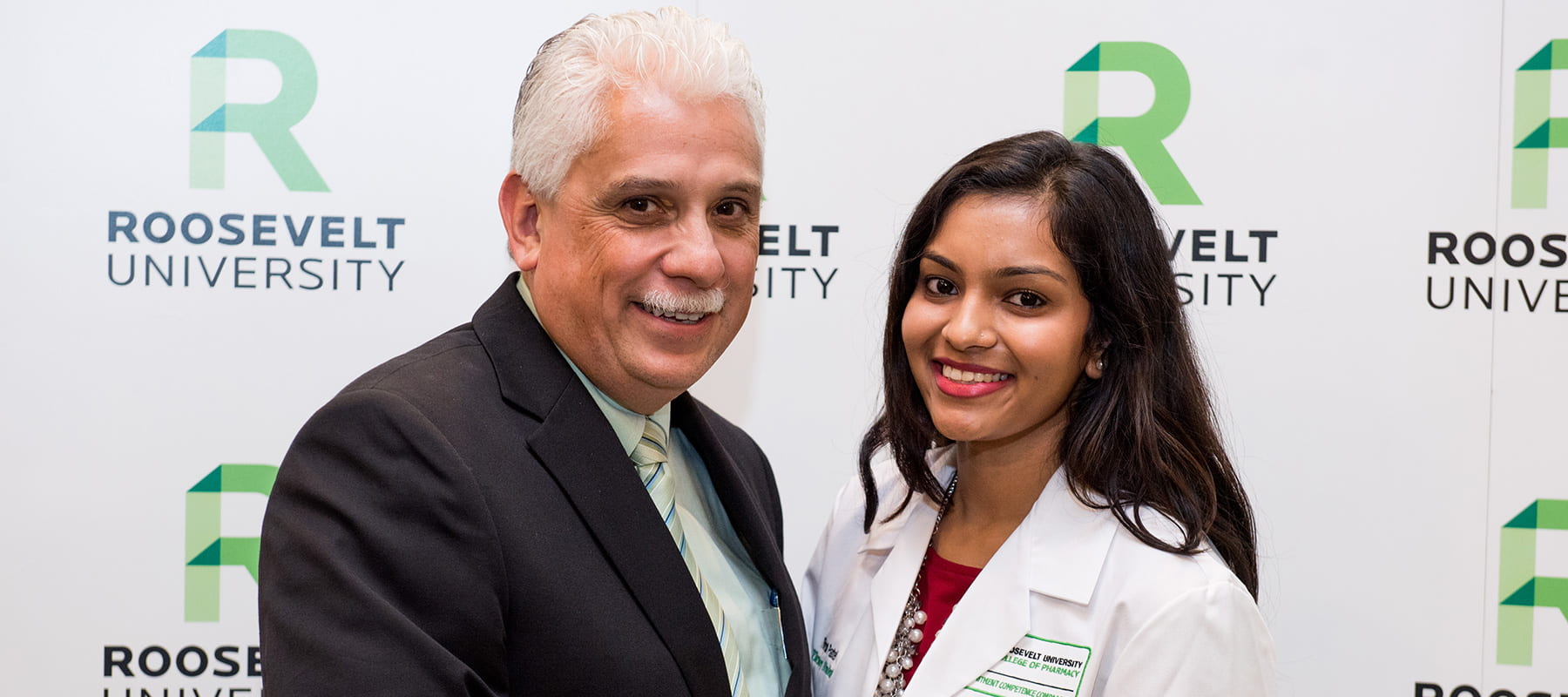
Founding Dean of the College of Pharmacy George MacKinnon and Rimple Patel during her white coat ceremony.
Administration and Leadership
In 2019, Patel returned the Sinai Health System for her health-systems pharmacy administration and leadership residency. As a safety-net provider, Sinai Health System serves some of the most disadvantaged communities in Illinois. Many of their patients are underinsured or uninsured.
Patel’s competitive program includes rotations in pharmacy administration, medication safety, budget and finance, among others, to train her for diverse roles in the industry. After she completes her residency, Patel hopes to apply for pharmacy coordinator and manager roles at safety-net hospitals, to continue her work with underinsured patients. She will also continue to mentor College of Pharmacy students as a preceptor.
“Your network is your net worth,” Patel said. “At Roosevelt, I was surrounded by skilled faculty members and given many opportunities to expand my network.” Now, she hopes to pay it forward.
•2011: volunteers at the Carle Foundation Hospital.
•2017: completes rotations at Mount Sinai Hospital.
•2019: matches for a PGY2 residency at Sinai Health Systems.
More in this section
unexcused absence
Some of life’s most important lessons cannot be taught inside the four walls of a classroom. Matthew Beardmore’s travel has forced him to reassess how he thinks about work, family, politics, injustice and many other issues. He’s no longer tied to the beliefs of where he grew up.
traveling while home: self-discovery through the local
How can you make the long trip home if you don’t actually leave there? A partnership between Roosevelt University’s Honors Program and Chicago Architecture Center asks students to experience space and place as sites for action—not simply places we passively inhabit.
creating a new travel niche while wandering the globe
In early 2011, Sahara Rose De Vore bought a one-way ticket to Costa Rica. Over the next 10 years, she explored 84 countries. The self-discovery she experienced inspired her to launch two successful businesses—both helping others discover the benefits of travel.


